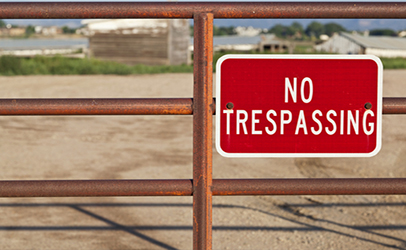
The Idaho House is now ready for a floor vote that will likely send Senate Bill 1337 to Republican Gov. C.L. “Butch” Otter for his signature. It would make trespassing and filming agricultural operations without permission of the owner illegal.
After three-and-a-half hours of testimony on Thursday, the House Agriculture Affairs Committee on a 13-to-1 vote sent the Agriculture Protection Act containing some familiar “ag-gag” provisions to the House floor with a “do-pass” recommendation.
About 130 people signed into the hearing, which pitted state and national animal-welfare activists against a solid wall of Idaho agriculture representatives. The committee’s favorable action on the bill was never really in doubt.
The Humane Society of the United States (HSUS) sent in its top public policy manager, Matt Dominguez, to Boise in a last-minute attempt to prevent S. 1337 from reaching the House floor. But Dominguez, who grew up on a farm, and the HSUS Idaho director both ended up being grilled by committee members.
Dominguez was asked whether farm animal abuse investigations like the one undertaken in Idaho in 2010 are mere tactics of a larger strategy aimed at the total elimination of animal agriculture as we know it, and he was also pressed for an estimate of how much of its own money HSUS spends on animal rescue.
“The Humane Society is not out to end animal agriculture at all,” Dominguez assured the Idaho House committee. “We support farmers who treat their animals humanely,” he said.
Dominguez said he did not know what percentage of the group’s approximately $160-million annual operating budget supports animal rescue. He said the HSUS goal is to stop animal abuse, but it does help local rescue and shelter activities.
He did acknowledge that HSUS may have a board member or two who talked of eliminating animal agriculture when they were “in their twenties,” but he insisted that is not the group’s policy today.
Lisa Kauffman, the Idaho state director for HSUS, came under more direct fire for a letter she sent in January to the dairy that was the target of the 2012 undercover investigation that prompted the legislative action.
Hansen, ID-based Bettencourt Dairies took the letter as a threat because Kauffman wrote that the company’s reputation would be hurt if it did not persuade the state’s dairy industry to drop the bill. Kauffman said she did not mean it that way, but merely thought since Bettencourt acted responsibility after the animal abuse was disclosed, it might see her point.
In addition to the Idaho Dairymen’s Association, which has put the weight of the state’s $2.5-billion dairy industry behind the bill, other ag organizations testified in favor of the bill on Thursday.
Strong statements of support also came from Idaho’s $500-million seed industry. Representatives of that industry said they are concerned about damage to genetically engineered seed research like the incidents that occurred recently in Oregon.
The many opponents of S. 1337 were almost all in agreement that Section D, which forbids taking pictures or making films or video without permission, is the most damaging part of the proposed law. Lobbyists for Idaho’s construction industry and some state conservation groups also voiced their opposition.





